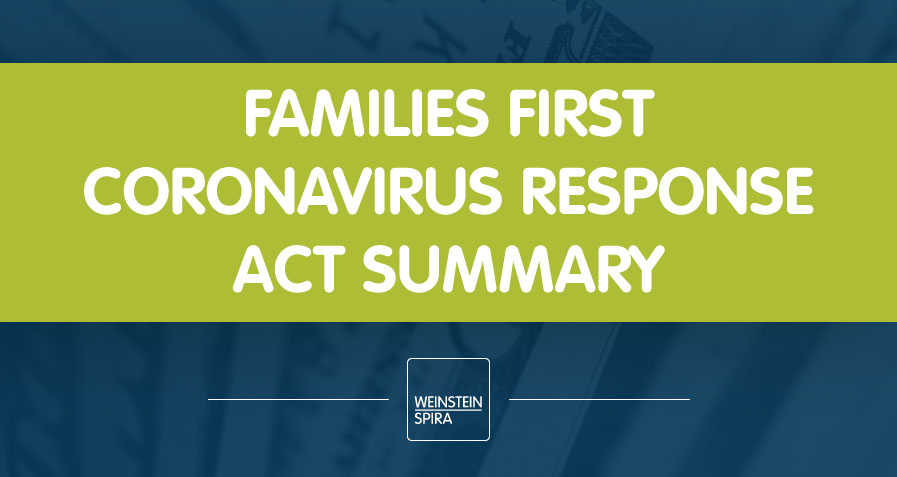Relief Available for Businesses and Individuals
The Families First Coronavirus Response Act (the Act), enacted on March 18, 2020, requires employers with fewer than 500 employees to provide a certain amount of paid sick and paid family leave to employees affected by COVID-19. The Act temporarily expands the reasons employees may take leave under the Family and Medical Leave Act (FMLA) and how much employees should be compensated when enacting leave. Employers are eligible to receive corresponding employment tax credits to offset costs to businesses. The Act took effect April 1, 2020, and applies for leave taken between April 1, 2020 and December 31, 2020.
Below is a brief description of the eligibility and requirements under the Act.
Generally, the Act states that covered employers must provide the following to all employees:
- Two weeks (up to 80 hours) of paid sick leave at the employee’s regular rate of pay if the employee is unable to work because the employee is (1) experiencing COVID-19 symptoms, (2) seeking a medical diagnosis, (3) quarantined by government order or (4) self-quarantined by advice of their health care provider.
-
- Employees are eligible to receive paid sick leave at their regular rate not to exceed $511/a day, up to $5,110 in aggregate.
- Two weeks (up to 80 hours) of paid sick leave at two-thirds the employee’s regular rate of pay if the employee is unable to work because the employee is caring for people who are experiencing COVID-19 symptoms, seeking a medical diagnosis or has a child (under 18 years of age) whose school or childcare provider is closed.
-
- Covered employees are eligible to receive paid sick leave at two-thirds their regular rate not to exceed $200/day or $2,000 in aggregate.
-
- Employees who care for a person subject to quarantine restrictions by a government order or advice of a health care provider are also eligible for two-thirds paid sick leave under the Act.
A covered employer must provide the following to employees that it has employed for at least 30 days:
- Up to an additional 10 weeks of paid expanded family and medical leave at two-thirds of the employee’s regular rate of pay where the employee is unable to work because they are caring for a child (under 18 years of age) whose school or childcare provider is closed. This also covers employees who are unavailable for reasons related to COVID-19. Covered employees must be paid two-thirds of their regular rate not to exceed $200/day or $10,000 in aggregate.
Employers are eligible to take a tax credit against employment taxes for the amount of leave or pay (including increases of group health plan costs) under this Act, subject to the above-mentioned limits. Any amount paid under this Act exceeding employment taxes due will be treated as an over-payment of employment taxes and considered a refundable credit.
Employers with fewer than 50 employees may qualify to be exempted from the additional requirements under this Act.
There are still many questions surrounding eligibility and various requirements of this Act. We are awaiting further guidance from the Department of Labor and will update our website accordingly.
Please contact Weinstein Spira with specific questions regarding the Act.



